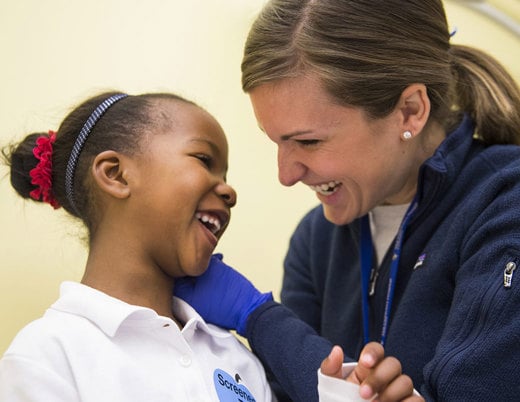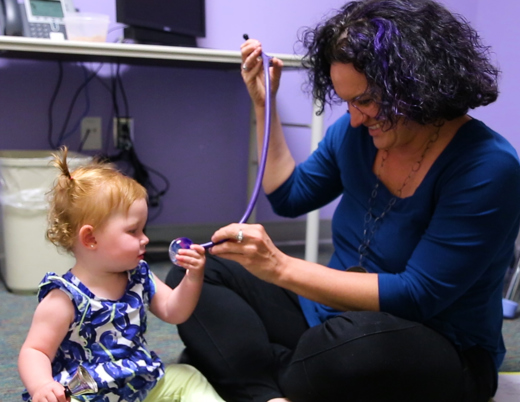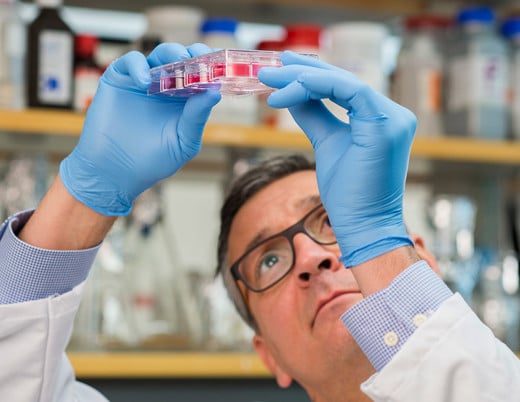Key takeaways
-
Kinase inhibitors are effective when used in cancer therapies, but tumors often develop resistance to the treatment.
-
Brain tumors with a mutation called BRAFV600E use autophagy to survive treatment from drugs that target it.
-
Through this study, our researchers discovered that blocking autophagy in patients could be a safe and effective strategy to improve their response to existing therapies to target the BRAFV600E mutation.
Background: Brain and spine tumors resist treatment
Brain and spine tumors are the second most common type of pediatric cancers, and are responsible for killing more children than any other type of cancer. Kinase inhibitors are effective cancer therapies, but tumors often develop resistance. Current strategies to avoid resistance target the same or parallel pathways.
Like other cancers, brain and spine tumors often use a process called autophagy to survive the treatments (which means that the treatment doesn’t work to stop the spread of cancer). Autophagy allows cells to reuse proteins for energy when the cell is being threatened.
In 2014, Jean Mulcahy-Levy, MD, pediatric oncologist in the Center for Cancer and Blood Disorders at Children's Hospital Colorado, and other researchers found that brain tumors with a mutation called BRAFV600E use autophagy to survive treatment from drugs that target it. The BRAFV600E mutation is important because it is found in more than 50% of select tumors.
Researchers hypothesized that blocking autophagy may make the drugs more effective against BRAFV600E tumors and overcome resistance.
In the earlier research, a patient with a BRAFV600E brainstem ganglioglioma was successfully treated by repurposing the autophagy inhibitor chloroquine (CQ), which is an inexpensive, FDA-approved drug used to treat malaria. The patient received CQ after failure of the BRAF inhibitor vemurafenib, which suggests autophagy inhibition overcame the kinase inhibitor resistance.
"Lisa, the second patient to receive chloroquine therapy, is a young adult with a very strong will to live. But it was a high-risk, aggressive glioblastoma and by the time we started this work, she had already tried everything. For that population, survival rates are dismal. Miraculously, she had a response to this combination. Four weeks later, she could stand and had improved use of her arms, legs and hands," Dr. Mulcahy-Levy said.
Methods: Studying brain tumor cells from three patients
Many of the researchers in the 2014 study returned to test the hypothesis in vemurafenib-resistant brain tumors. The experiment used widely-studied human brain tumor cells that can be grown in a laboratory and samples collected from three patients.
Results: Autophagy inhibition improved the response to BRAF inhibition
Genetic and pharmacologic inhibition overcame molecularly distinct resistance mechanisms, inhibited tumor cell growth and increased cell death. The three patients with resistance experienced positive clinical response when CQ was added to vemurafenib.
Specific findings included:
- Pharmacologic inhibition of autophagy overcomes BRAFi resistance in vitro
- Genetic inhibition of autophagy overcomes BRAFi resistance in vitro
- Autophagy inhibition improves clinically acquired BRAFi resistance ex vivo
- Autophagy inhibition enhances BRAFi response in multiple brain tumor types
- Autophagy inhibition can overcome distinct molecularly-defined BRAFi resistance mechanisms
- Autophagy inhibition decreases growth of brain tumors in patients resistant to BRAF inhibition
- Rechallenge with combination BRAF and autophagy inhibition effective in a patient with persistent BRAFi resistance
Taken together, the data suggest that regardless of the resistance mechanism to the BRAF inhibitor, autophagy inhibition improved the response to BRAF inhibition.
Conclusions: Blocking autophagy can be safe and effective to treat brain cancers
Autophagy inhibition is a fundamentally different strategy to avoid multiple mechanisms of kinase inhibitor resistance that can be tested in clinical trials in patients with BRAFV600E brain tumors.
The findings suggest that blocking autophagy in patients could be a safe and effective strategy to improve their response to existing therapies to target the BRAFV600E mutation. Future clinical trials are being planned at the Center for Cancer and Blood Disorders at Children's Colorado to test more patients and verify this treatment plan can be broadly effective in patients with these types of brain cancers.
"We have treated three patients with the combination and all three have had a clinical benefit. It's really exciting – sometimes you don't see that kind of response with an experimental treatment. In addition to Lisa, another patient was on the combination for two-and-a-half years. She's in college, excelling and growing into a wonderful young adult, which wouldn't have happened if we hadn't put her on this combination."
- Jean Mulcahy-Levy, MD
Featured Researchers

Jean Mulcahy Levy, MD
Pediatric neuro-oncologist
Center for Cancer and Blood Disorders
Children's Hospital Colorado
Associate professor
Pediatric Hematology/Oncology and Bone Marrow Transplantation
University of Colorado School of Medicine





 720-777-0123
720-777-0123










